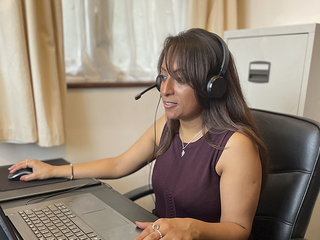Leukemia symptoms and signs
Leukemia symptoms commonly include fatigue, breathlessness, infections, and bruising or bleeding more easily.
Leukemia* symptoms vary depending on the type of leukemia. Not everyone gets the same symptoms, and you won't necessarily have all of the symptoms.
Most people with these symptoms won’t have leukemia. But some people will, and the earlier it’s diagnosed, the higher the chance of treatment being successful.
Even if you only have one symptom, if it’s unexplained, goes on for a long time, or is unusual for you, you should contact your GP.
If you know which type of leukemia you need information about, go to that type for more specific information:
Leukemia symptoms
Leukemia symptoms commonly include:
- fatigue (tiredness that lasts a long time and doesn’t improve with rest)
- bruising and bleeding more easily, or bleeding that takes longer to stop
- infections that are more frequent, severe, or last longer
- fever (high temperature)
- weight loss that is unexplained
- swollen lymph nodes (glands in your neck, armpit and groin)
- breathlessness
- feeling generally unwell.
There are other general symptoms of leukemia such as loss of appetite and headaches. Contact your GP if you're worried about any symptoms you’re experiencing.
Infections
Infections that are more frequent, severe, or last longer, are a common symptom of leukemia. If you have leukemia, even if it’s not been diagnosed, an infection can be very serious or even life-threatening. Find out more about symptoms of an infection to watch out for.
If you think you have an infection, you should tell your GP, and tell them if you’ve been having more frequent infections, or any other symptoms.
Anaemia
Leukemia can cause anaemia. Anaemia means having a low level of red blood cells in your blood. Symptoms of anaemia are:
- tiredness
- breathlessness
- dizziness or feeling faint
- chest pain
- pale skin.
Bleeding problems
Leukemia can affect your platelets (cells that help your blood to clot). If your platelets aren’t working properly, you may have:
- red or purple spots or rashes on your skin (petechiae or purpura) caused by bleeding under the skin
- blood in your poo
- black, tarry poo, or poo that is streaked with red (because of bleeding in your gut)
- in women, heavy periods
- difficulty with speaking or moving parts of the body, if there is bleeding into the brain.
Increased sweating
You may have:
- increased sweating, particularly at night
- drenching night sweats.
Enlarged spleen or liver
Leukemia cells can build up in your spleen or liver, causing swelling or an enlarged spleen. Symptoms of this would include:
- bloating, swelling, general discomfort and sometimes pain around the stomach area or under your ribs on the left
- feeling full after only eating small amounts.
Bone pain
Leukemia cells can build up in the bone marrow (the soft, spongy material inside some of our bones). This can cause:
- bone pain
- in children, limping or avoiding walking due to bone pain.
Blood clots
Leukemia can sometimes cause blood clots to develop. Symptoms of a blood clot are:
- a painful or swollen leg due to blood clots in the leg or tummy area
- chest pain and difficulty breathing due to blood clots in the lungs
- headache, being sick (vomiting) or problems with vision due to blood clots in the brain.
Acute leukemia symptoms
Acute myeloid leukaemia (AML) or acute lymphoblastic leukaemia (ALL) can develop very quickly into leukostasis or blast crisis. This means you have a very high level of white blood cells in your blood. This will make you suddenly feel very unwell and is an emergency. Symptoms may include breathing problems and neurological symptoms like changes to your vision, confusion, vomiting, loss of muscle control or seizures.
If you have these symptoms get medical help straight away by calling 999 or going to A&E.
Chloroma
A rare symptom of acute myeloid leukaemia (AML) is a chloroma. This is a lump under the skin, where leukemia cells have collected.
Worried about leukemia?
Most people with these symptoms won’t have leukemia. But some people will, and the earlier it’s diagnosed, the higher the chance of treatment being successful.
If you have just one symptom that you can’t explain, that goes on for a long time, or that’s unusual for you, book an appointment with your GP.
If you suddenly feel very unwell, get medical help straight away by calling 999 or going to A&E.
Free blood cancer symptoms guide
Our free blood cancer symptoms guide is a pocket-sized reminder of the symptoms of blood cancer and provides space for you to record any that you might experience. If you need to get checked out, it also includes things to think about before your appointment and questions to ask your doctor.

Worried about anything or have questions?
If you need someone to talk to, please don't hesitate to contact our Support Service by phone or email.
More leukemia information
We have more information about leukaemia, what it is, how it’s diagnosed and treated, and the prognosis.
*We've used both the English and American spellings of leukaemia/leukemia on this page, to make sure that anyone searching for information and support in the UK can find our information, however they spell leukaemia.
